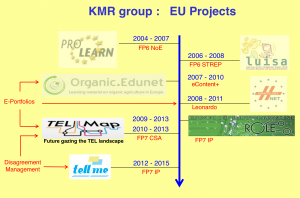Welcome to the web site of the KMR group! We are based at the School of Electrical Engineering and Computer Science EECS [formerly (= pre 2018) the School of Computer Science and Communication] (CSC) at the KTH Royal Institute of Technology in Stockholm, Sweden.
The KMR group is driven by a desire to create new and powerful ways to structure and communicate information in order to support its exformation into knowledge and transmutation into understanding. We have worked with what we call Asynchronous Public Service in the form of infrastructures, architectures, frameworks and tools that contribute towards the creation of a Public Knowledge and Learning Management Environment (PKLME), which enables a distributed asynchronous public discourse that aims to enhance the learning of all participants. All our software is Open Source and based on technologies for Semantic Web and Linkable Open Data.
Our research activities and results are documented at our publications pages as well as our pages on The Mathematical Explainatorium, Asynchronous Public Service, Modeling and mapping, Disagreement management,
Within the field of knowledge management we have specialized in methods and tools for communicative modeling, ad-hoc collaboration and disagreement management, based on innovative and powerful ways to handle descriptional data (so called metadata). We have based our descriptional work on the graph-based view of metadata provided by RDF that has become the foundation of the linked data movement.
The work of the KMR group has resulted in a number of infrastructures, architectures, frameworks and tools that can contribute to the creation of a Public Knowledge and Learning Management Environment (PKLME), which enables a public discourse that aims to enhance the learning of all participants. Our flagship tools are the electronic portfolio system Confolio and the concept browser Conzilla, which are both based on our frameworks SCAM (Standardized Contextualized Access to Metadata) and SHAME (Standardized Hyper-Adaptable Metadata Editor).
European projects that we have been participating in:
• PROLEARN, (2004-2007), a Network of Excellence for PROfessional LEARNing.
• LUISA, (2006-2008), which developed semantic search, retrieval, and aggregation of learning resources.
• Organic.Edunet, (2007-2010), which created a semantically searchable European network of archives for content providers and educators in organic farming and agroecology. Since then, our Confolio system has been adopted by the AGROASIS network for both a content archive back-end and a community portal front-end.
• ROLE, (2009-2012), (Responsive Open Learning Environments), which dealt with configuring and supporting personalized learning environments.
• H-net , (2009-2011), (Hematology Net), which built a Hematology Confolio Network to support personalized competence development within the professional community of European hematology.
• TEL-Map , (2010-2013), which created a dynamic roadmapping platform based on Conzilla future-gazing and awareness building for Technology Enhanced Learning in Europe and beyond.
• TELL ME , (2012-2015), (Technology Enhanced Learning Livinglabs for Manufacturing Environments), which was about bringing innovative learning methods to manufacturers.
